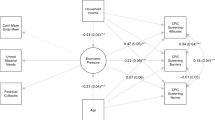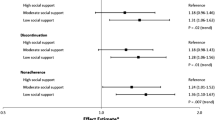This paper argues that normative considerations are more important than attitudinal factors in engaging colorectal cancer screening, and tests a model explaining how unique cultural expressions of social networks influence screening adherence. Structural equation modeling was used to understand colorectal cancer screening in a population-based sample of 341 Japanese Americans aged 50 and over. The model accounted for 25% of the variance in screening adherence. Adherence was most strongly associated with family/friend subjective norms about colorectal cancer screening use. Emotional family support, but not the size of the networks, was indirectly related to adherence via increased family/friend subjective norms, while emotional friend support was directly related to adherence. While usual source of care was directly associated with adherence, better provider-patient communication was directly and indirectly associated with adherence via increased perceived benefits. The findings of this study support strengthening informal support networks to enhance adherence among Japanese Americans at risk.


Similar content being viewed by others
References
Ajzen, A., and Fishbein, M. (1980). Understanding Attitudes and Predicting Social Behavior, Prentice-Hall, New Jersey.
Ajzen, I. (1985). From intentions to actions: A theory of planned behavior. In Kuhl, J., and Beckman, J. (Eds.), Action Control: From Cognition to Behavior, Springer-Verlag, Berlin, pp.11–40.
Ajzen, I. (1991). The theory of planned behavior. Organ. Behav. Hum. Decis. Process. 50: 179–211.
American Cancer Society (2005). Cancer Facts & Figures 2005, American Cancer Society, Atlanta, GA.
Anderson, J. C., and Gerbing, D. W. (1988). Structural equation modeling in practice: A revew and recommended two-step approach. Psychol. Bull. 103: 411–423.
Arbuckle, J. L. (1995). AMOS 4.0 Programming Reference Guide, SmallWaters, Chicago.
Arbuckle, J. L., and Wothke, W. (1999). AMOS 4.0 User's Guide, SmallWaters Corporation, Chicago.
Asian American Federation of New York Census Information Center (2004). Census profile: New York City's Japanese American. Asian American Federation.
Bandura, A. (1997). Self-Efficacy: The Exercise of Control, Freeman, New York.
Baquest, C. R., and Commiskey, P. (1999). Colorectal cancer epidemiology in minorities: A review. J. Assoc. Acad. Minor. Physicians 10: 51–58.
Bentler, P. M. (1990). Comparative fit indexes in structural models. Psychol. Bull. 107: 238–246.
Bollen, K. A. (1989). Structural Equations with Latent Variables, Wiley, New York.
Center for Disease Control and Prevention (July 23, 2004). Surveillance for certain health behaviors among selected local areas—United States, Behavioral Risk Factor Surveillance System, 2002. MMWR, 53, SS-05.
Champion, V. L. (1993). Instrument refinement for breast cancer screening behaviors. Nurs. Res. 42: 139–143.
Champion, V. L. (1995). Development of a benefits and barriers scale for mammography utilization. Cancer Nurs. 18: 53–59.
Chen, J. Y., Diamant, A. L., Kagawa-Singer, M., Pourat, N., and Wold, C. (2004). Disaggregating data on Asian and Pacific Islander women to assess cancer screening. Am. J. Prev. Med. 27(2): 139–145.
Clipp, E. C., Carver, E. H., Pollak, K. I., Puleo, E., Emmons, K. M., Onken, J., Farraye, F. A., and McBride, C. M. (2004). Age-related vulnerabilities of older adults with colon adenomas: Evidence from Project Prevent. Cancer 100(5): 1085–1094.
Dawson, E. J., Crano, W. D., and Burgoon, M. (1996). Refining the meaning and measurement of acculturation: Revisiting a novel methodological approach. Int. J. Intercultural Relat. 20: 97–114.
DeCarlo, L. T. (1997). On the meaning and use of kurtosis. Psychol. Methods 2: 292–307.
Dillman, D. (1978). Mail and Telephone Surveys: The Total Design Method, Wiley, New York.
DiMatteo, M. R. (2004). Social support and patient adherence to medical treatment: A meta-analysis. Health Psychol. 23(2): 207–218.
Doi, T. (1971). Amaeno Kouzoo (The structure of “Amae”), Koobundoo, Tokyo.
Flood, D. M., Weiss, N. S., Cook, L. S., Emerson, J. C., Schwartz, S. M., and Potter, J. D. (2000). Colorectal cancer incidence in Asian migrants to the United States and their descendants. Cancer Causes Control 11: 403–411.
Freimuth, V. S., and Quinn, S. C. (2004). The contributions of health communication to eliminating health disparities. Am. J. Public Health 94: 2053–2055.
Giuliano, A. R., Mokuau, N., Hughes, C., Tortolero-Luna, G., Risendal, B., Ho, R. C. S., Prewitt, T. E., and McCaskill-Stevens, W. J. (2000). Participation of minorities in cancer research: The influence of structural, cultural, and linguistic factors. Ann. Epidemiol. 10(8 Suppl): S22–34.
Green, P. M., and Kelly, B. A. (2004). Colorectal cancer knowledge, perceptions, and behaviors in African Americans. Cancer Nurs. 27(3): 206–215.
Greene, M. G., and Adelman, R. D. (2003). Physician-older patient communication about cancer. Patient Educ. Couns. 50(1): 55–60.
Hawley, S. T., Levin, B., and Vernon, S. W. (2001). Colorectal cancer screening by primary care physicians in two medical care organizations. Cancer Detect. Prev. 25(3): 309–318.
Heaney, C. A., and Israel, B. A. (1997). Social networks and social support. In Glanz, K., Lewis, F. M., and Rimer, B. (Eds.), Health Behavior and Health Education: Theory, Research, and Practice, Jossey-Bass Publications, San Francisco, pp.179–205.
Honda, K. (2004). Factors associated with colorectal cancer screening among the US urban Japanese population. Am. J. Public Health 94(5): 815–822.
Hu, L., and Bentler, P. M. (1999). Cutoff criteria for fir indices in covariance structure analysis: Conventional criteria versus new alternatives. Struct. Equation Model. 6: 1–55.
Hunt, L. M., Schneider, S., and Comer, B. (2004). Should “acculturation” be a variable in health research? A critical review of research on US Hispanics. Soc. Sci. Med. 59(5): 973–986.
Ino, S. M., and Glicken, M. D. (2002). Understanding and treating the ethnically Asian client: A collectivist approach. J. Health Soc. Policy 14(4): 37–48.
Joreskig, K. G. (1993). Testing structural equation models. In Bollen, K. A., and Long, J. S. (Eds.), Testing Structural Equation Models, Sage, Newbury Park, CA, pp. 294–316.
Joreskog, K. G., and Sorbom, D. (1996). LISREL 8: User's Reference Guide, Scientific Software International, Chicago.
Kagawa-Singer, M., and Kassim-Lakha, S. (2003). A strategy to reduce cross-cultural miscommunication and increase the likelihood of improving health outcomes. Acad. Med. 78: 577–587.
Kakai, H., Maskarinec, G., Shumay, D. M., Tatsumura, Y., and Tasaki, K. (2003). Ethnic differences in choices of health information by cancer patients using complementary and alternative medicine: An exploratory study with correspondence analysis. Soc. Sci. Med. 56(4): 851–862.
Katz, M. L., James, A. S., Pignone, M. P., Hudson, M. A., Jackson, E., Oates, V., and Campbell, M. K. (2004). Colorectal cancer screening among African American church members: A qualitative and quantitative study of patient-provider communication. BMC Public Health 4: 62.
Kessler, R. C., DuPont, R. L., Berglund, P., and Wittchen, H. U. (1999). Impairment in pure and comorbid generalized anxiety disorder and major depression at 12 months in two national surveys. Am. J. Psychiatry 156(12): 1915–1923.
Kinney, A. Y., Bloor, L. E., Dudley, W. N., Millikan, R. C., Marshall, E., Martin, C., and Sandler, R. S. (2003). Roles of religious involvement and social support in the risk of colon cancer among Blacks and Whites. Am. J. Epidemiol. 158(11): 1097–1107.
Kline, R. B. (1998). Principles and Practice of Structural Equation Modeling, Guilford Press, New York.
Kreps, G. L., O’Hair, D., and Clowers, M. (1995). Communication and health. In Kreps, G. L., and O'Hair, D. (Eds.), Communication and Health Outcomes, Hampton, Cresskill, NJ, pp. 5–18.
Kreuter, M. W., Skinner, C. S., Steger-May, K., Holt, C. L., Bucholtz, D. C., Clark, E. M., and Haire-Joshu, D. (2004). Responses to behaviorally vs. culturally tailored cancer communication among African American women. Am. J. Health Behav. 28(3): 195–207.
Lepore, S. J., Helgeson, V. S., Eton, D. T., and Schulz, R. (2003). Improving quality of life in men with prostate cancer: A randomized controlled trial of group education interventions. Health Psychol. 22(5): 443–452.
Marchand, L. L. (1999). Combined influence of genetic and dietary factors on colorectal cancer incidence in Japanese Americans. J. Natl. Cancer Inst. Monogr. 26: 101–105.
McLaughlin, L. A., and Braun, K. L. (1998). Asian and Pacific Islander cultural values: Considerations for health care decision making. Health Soc. Work 23(2): 116–126.
Messecar, D. (2000). Mammography screening for older women with and without cognitive impairment. J. Gerontol. Nurs. 26: 14–24.
Miller, S. M., Shoda, Y., and Hurley, K. (1996). Applying cognitive-social theory to health-protective behavior: Breast self-examination in cancer screening. Psychol. Bull. 119(1): 70–94. Review.
Nelson, D. E., Kreps, G. L., Hesse, B. W., Croyle, R. T., Willis, G., Arora, N. K., Rimer, B. K., Viswanath, K. V., Weinstein, N., and Alden, S. (2004). The Health Information National Trends Survey (HINTS): Development, design, and dissemination. J. Health Commun. 9(5): 443–460, discussion 81–84.
O’Malley, A. S., Kerner, J., Johnson, A. E., and Mandelblatt, J. (1999). Acculturation and breast cancer screening among Hispanic women in New York. Am. J. Public Health 89: 210–227.
Ries, L. A. G., Kosary, C. L., Hankey, B. F., Miller, B. A., Clegg, L. X., and Edwards, B. K. (Eds.) (1999). SEER Cancer Statistics Review, 1973—1996, National Cancer Institute, Bethesda, MD. NIH Publication 99-2789.
Sorensen, G., Barbeau, E., Hunt, M. K., and Emmons, K. (2004). Reducing social disparities in tobacco use: A social-contextual model for reducing tobacco use among blue-collar workers. Am. J. Public Health 94(2): 230–239.
Steiger, J. H., and Lind, J. M. (1980). Statistically Based Tests for the Number of Common Factors, Iowa City, IA.
Stein, J. A., and Fox, S. A. (1990). Brief communication: Language preference as an indication of mammography use among Hispanic women. J. Natl. Cancer Inst. 82: 1715–1716.
Taylor, M. L., and Anderson, R. (2002). Colorectal cancer screening: Physician attitudes and practices. WMJ 101(5): 39–43.
Taylor, V., Lessler, D., Mertens, K., Tu, S. P., Hart, A., Chan, N., Shu, J., and Thompson, B. (2003). Colorectal cancer screening among African Americans: The importance of physician recommendation. J. Natl. Med. Assoc. 95(9): 806–812.
U.S. Department of Health and Human Services (November 2000). Healthy People 2010. 2nd ed. With Understanding and Improving Health and Objectives for Improving Health. 2 vols. U. S. Government Printing Office, Washington, DC.
Van Der Molen, B. (1999). Relating information needs to the cancer experience. Eur. J. Cancer 8: 238–244.
Vernon, S. W. (1997). Participation in colorectal cancer screening: A review. J. Natl. Cancer Inst. 89: 1406–1422.
Wellisch, D. W., Kagawa-Singer, M., Reid, S., et al. (1999). An exploratory study of social support: A cross-cultural comparison of Chinese-, Japanese, and Anglo-American breast cancer patients. Psycho-Oncology 8: 207–219.
Wong, S. T., and Gildengorin, G. (2004). Colorectal cancer screening among Asian Americans. Presented at 5th Asian American Cancer Control Academy. Available at http://www.aancart.org/academy/Presentations/FRI_Breakout/SWong_ColorectalScreening.ppt. Accessed November 29, 2004.
ACKNOWLEDGMENTS
This project was supported by a grant from the National Institute on Aging (P30/AG15394). The authors thank Karen E. Emmons for helpful suggestions on earlier drafts; Jeanne A. Teresi for assistance with data analyses and interpretation; and Columbia Center for the Active Life of Minority Elders (CALME) for its guidance and input throughout this project.
Author information
Authors and Affiliations
Corresponding author
Rights and permissions
About this article
Cite this article
Honda, K., Kagawa-Singer, M. Cognitive Mediators Linking Social Support Networks to Colorectal Cancer Screening Adherence. J Behav Med 29, 449–460 (2006). https://doi.org/10.1007/s10865-006-9068-1
Received:
Accepted:
Published:
Issue Date:
DOI: https://doi.org/10.1007/s10865-006-9068-1




